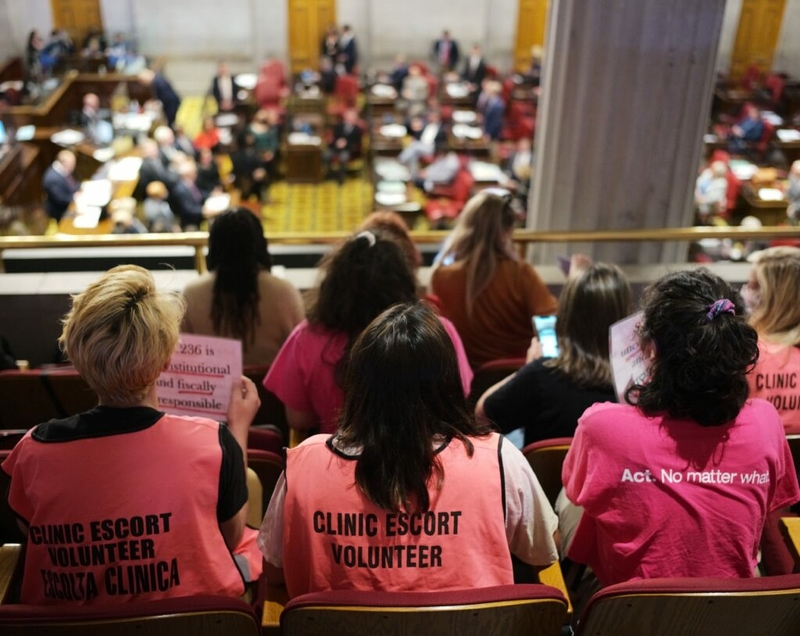House passes abortion decriminalization bill despite complaints it will hurt women

After lively debate Monday, the Tennessee House passed legislation decriminalizing some forms of abortion in the state, giving physicians the opportunity to save women experiencing deadly pregnancies based on “reasonable judgment.”
The House voted 83-11 in favor of the legislation with two abstaining. Two Republicans voted against the bill, and 13 Democrats voted for it.
The bill was changed significantly in the House Health Committee last week after the original amendment passed in the Population Health Subcommittee on Feb. 14 with only one no vote.
Rep. Esther Helton-Haynes acknowledged last week that Tennessee Right to Life endorsed the newer amendment. But sources told the Tennessee Lookout, the language was written by the governor’s office and the Senate speaker’s office with help from the attorney general’s office.
“When I committed to carry this legislation, I was determined to make sure the affirmative defense was removed so doctors could protect the lives of mothers and babies. We accomplished that with this amendment,” said Rep. Esther Helton-Haynes, an East Ridge Republican who sponsored the measure.

Helton-Haynes contended the bill provides more “clarify” and enables physicians to remain innocent until proven guilty by removing the “affirmative defense” that would force them to defend themselves in court, cover their costs and potentially affect their liability insurance and hospital privileges.
Democrats continued to argue that the language in the bill is too narrow and could put women in a dangerous situation, forcing doctors to wait until the last minute to save a woman by aborting a pregnancy.
Yet Republicans defeated Democrats’ efforts to set exceptions for rape, child rape and incest and a clear definition to allow physicians to protect the life of a pregnant mother in a risky pregnancy.
State Rep. Gloria Johnson, D-Knoxville, also sought to insert Roe v. Wade into state law after the U.S. Supreme Court reversed it last summer, setting the stage for Tennessee’s abortion ban to take effect.
“Tennessee is telling women they are not equal citizens,” Johnson said, arguing that victims of rape will be forced to give birth to their attacker’s baby.
State Rep. Andrew Farmer, R-Sevierville, criticized her legislation, saying the legislation allows physicians to make a “reasonable medical judgment” to protect unborn babies and mothers.
“We’ve worked hard to protect the lives of those babies. If we can protect the lives of mothers, we’re going to do that as much as possible,” Farmer said.
Some lawmakers were left with what they considered a bad option.
Rep. G.A. Hardaway, D-Memphis, said young girls would be put in jeopardy and forced to raise a child of a rapist. But he agreed that it would allow some options for other women.
“I’m going to vote for the bill because it’s better than nothing,” Hardaway said.
We’ve worked hard to protect the lives of those babies. If we can protect the lives of mothers, we’re going to do that as much as possible.
Rep. Bo Mitchell, D-Nashville, told Helton-Haynes she had been put in a difficult situation because the legislation wouldn’t give physicians enough time to save women.
“We’re still making a doctor make a legal decision instead of a medical decision,” Mitchell said, adding he couldn’t vote for the bill.
The definition of abortion in the bill specifies ectopic and molar pregnancies, including those that occur outside the uterus or involve cancer, or to remove a miscarriage.
However, the term “elective abortion” is removed from the bill’s language and the wording is changed to say a person commits a Class C felony for performing an abortion unless it is done by a licensed physician in a hospital and used “reasonable medical judgment” to determine the abortion was necessary to prevent the woman’s death or “substantial and irreversible impairment of a major bodily function.”
The physician also must provide the best opportunity for an unborn child to survive unless, using “reasonable medical judgment,” ending the pregnancy would pose a greater risk of death to the woman or irreversible impairment of bodily functions.








